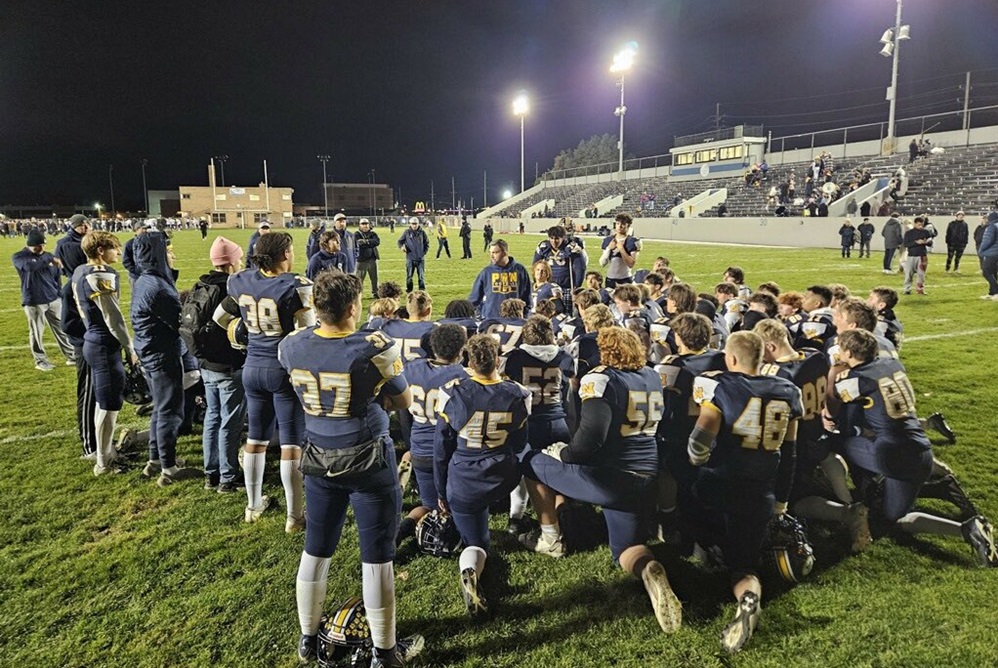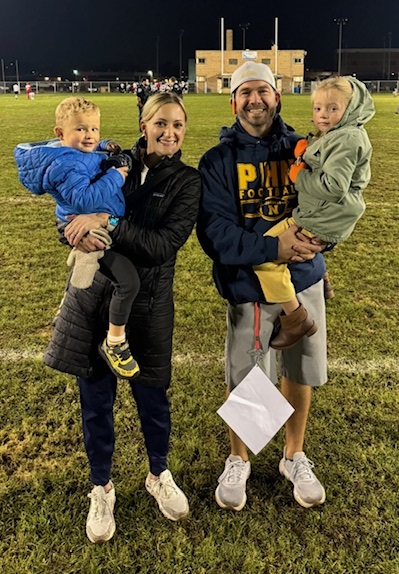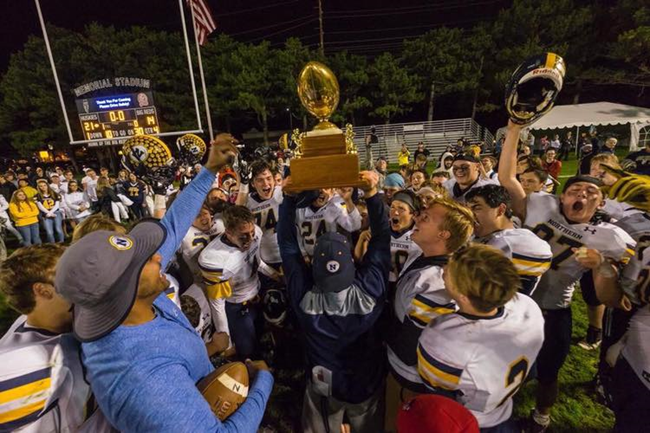
Writer-Turned-Coach Enjoys Debut
November 3, 2016
By Dennis Grall
Special for Second Half
ESCANABA — Sam Eggleston has seen high school football from two drastically different viewpoints. Now, even though he is an unpaid volunteer, he enjoys being on the sideline as a coach.
 Eggleston just completed his first season as a high school head coach, with Eben Superior Central winning its final three games to finish 4-5 in 8-player football. The Cougars were among the first teams in the state to join the 8-player format in 2010, their first year of football.
Eggleston just completed his first season as a high school head coach, with Eben Superior Central winning its final three games to finish 4-5 in 8-player football. The Cougars were among the first teams in the state to join the 8-player format in 2010, their first year of football.
Eggleston was a sportswriter before becoming a coach, giving him different perspectives to watching the same event.
The 1998 Rock Mid Peninsula High School graduate worked at newspapers in Escanaba, Kenai, Alaska; Northville and Novi, and Marquette before becoming a freelance writer and website blog editor in 2008. He started the writing phase of his career in 2000 with the Daily Press in Escanaba, under my direction.
He served as a volunteer assistant football coach in Northville, then moved back to the Upper Peninsula and became a volunteer coach at his alma mater in 2011 when the Wolverines went to 8-player football. He joined Superior Central in 2014 and spent two seasons as a volunteer aide until landing the head job just two weeks before the 2016 preseason began.
“In both careers … you took a shot on me and I ran with it, and the same with coaching; they gave me a shot and I’ve run with it as best I can,” he said.
In addition to his unpaid position at Superior Central, in rural Alger County, Eggleston is responsible for fundraising for the self-funded football program, a major priority for his offseason.
“My coaching is over (for the season) now and the majority of my time will be spent on raising funds so we can get new helmets, get new pads to replace ones that are broke, spending money we don’t have so we’ve got to make that up now,” he said. “We have to win now to have successful fundraisers.”
As a sportswriter, Eggleston would simply switch gears and move on to coverage of the next athletic season, for instance once fall sports moved into winter. He also never had to worry about how coaches managed off-field X’s and O’s once their seasons concluded.
Life was totally different as a reporter. “I had a different approach, different viewpoint, different mindset to a game as a writer,” said Eggleston, who still has the heft of when he was a lineman but now looks like a lumberjack with his bushy beard and build.
“Now I have to worry about every kid and every position,” he said. “Sometimes I don’t even see the end result of the play because I’m watching the line play. I don’t even know how well my running back did until I see where they moved the stick.”
He may also be working on an injured player while the game goes on, trying to make play calls and other decisions at the same time.
As a sportswriter, he would be jotting down notes between plays or perhaps checking the result of a picture he took of the previous snap, totally unaware the coach was monitoring several assignments.
“I look back at the writer I was and as a coach now, and I would hate the type of writer I was,” he said.
Eggleston would analyze why a coach would switch to running a sweep rather than the counter that had been working, all while the coach may be working on an injured player that caused a change in offensive plans.
“As a writer I never had the insight to see everything. I just saw the overall game and kept track of every yard,” he said. “As a coach I can’t even tell if the play went five yards because I have three plays stacked up as the game goes on.”
While he was writing sports in the metro Detroit area, his weekly paper often covered games also being covered by the Detroit Free Press or the Oakland Press, with those stories appearing the next day. Eggleston’s story would appear maybe five days later, after everyone knew what happened.
 “I had to come in with a different angle. I tried to be a little more analytical and focus on strategy versus the flourish and try to get the meat of the game rather than get to the flowery parts,” he recalled. “I tried to take a different approach and make my stuff more interesting.”
“I had to come in with a different angle. I tried to be a little more analytical and focus on strategy versus the flourish and try to get the meat of the game rather than get to the flowery parts,” he recalled. “I tried to take a different approach and make my stuff more interesting.”
His style apparently worked as the paper received several journalism awards and subscriptions remained strong.
Writing also provided some interesting backdrops. He had to use small charter planes to see some games in Alaska, or get to Nome to handle features about the Iditarod sled dog race.
He recalls covering a high school hockey game on an outdoor rink in Alaska and said “it was the first time I saw wind shear affect a hockey game.”
Eggleston also covered a football game where a kicker booted the ball off the uprights, then off a fence, and it bounced into the ocean in Homer.
He reported on a murder trial at that paper, where he would work the news desk in the morning, take time off and then handle sports at night. “It was super stressful,” he said.
Now walking the sidelines as a coach, he said “it definitely does feel like I’ve seen both sides of the coin, and I understand both sides of them better.”
He remembers just giving “little more rounded answers and (to) give both sides of the story” in postgame interviews. “A lot of coaches give canned answers. I try to be a little more in-depth and help try to write the story.”
In his early days as a sportswriter, he said “I would see the game unfold and see the pressures and why a coach would make a decision to go for it (on fourth down). I was a bit more critical of the coach and their decision,” he said, adding “I would probably have been a little more biting about it when I wrote the story.”
He admits in those days “I thought I knew everything there was to know about football. I played it,” he said. “I always approached the game like I was the professional and knew everything about the game. Now as a coach there are a host of responsibilities during every game. I am in completely different waters now. The hardest thing is keeping the kids pointed in the right direction as things go wrong.
“You’ve got the entire team and you’ve got to keep moving in a positive direction, keep the focus going forward. Forget the last play and work on the next one and get the kids to buy into that philosophy.”
He also compares his first writing assignment at the Daily Press with his first game this season at Ontonagon. “I did a (men’s baseball) story about the Escanaba Polecats, and you read my first line and said, ‘Did Yoda write this?’ I thought, oh my God, I don’t know what I’m doing.”
The Cougars lost their opener this fall 36-8, and Eggleston said “after being an assistant for four years, I still wasn’t prepared going into that Ontonagon game. We lost, and as I look back, if we played them right now I think we would beat them.
“I had no clue coming into that first game and didn’t have any idea how to get us back on track.”
He eventually figured enough out to finish 4-5 and found plenty of ways to enjoy being a coach.
Eggleston tries to eat lunch with his players every day, and he pays for his own meal.
“I want a family environment there; we all sit at the same table,” he said. “What I get back is relationships I never had before. I feel like I have 21 kids, and I love every minute of it.”
 Denny Grall retired in 2012 after 39 years at the Escanaba Daily Press and four at the Green Bay Press-Gazette, plus 15 months for WLST radio in Escanaba; he served as the Daily Press sports editor from 1970-80 and again from 1984-2012. Grall was inducted into the Upper Peninsula Sports Hall of Fame in 2002 and serves as its executive secretary. E-mail him at [email protected] with story ideas for the Upper Peninsula.
Denny Grall retired in 2012 after 39 years at the Escanaba Daily Press and four at the Green Bay Press-Gazette, plus 15 months for WLST radio in Escanaba; he served as the Daily Press sports editor from 1970-80 and again from 1984-2012. Grall was inducted into the Upper Peninsula Sports Hall of Fame in 2002 and serves as its executive secretary. E-mail him at [email protected] with story ideas for the Upper Peninsula.
PHOTOS: (Top) Eben Junction Superior Central football coach Sam Eggleston speaks with some of his players during a game this season. (Middle) Eggleston monitors the action on the field. (Photos by Dennis Grall.)

Rebuilt Culture Driving Success as Roelens Steps Away at Port Huron Northern
By
Paul Costanzo
Special for MHSAA.com
November 13, 2024
The spark that helped ignite the past decade of success for the Port Huron Northern football program came early in Larry Roelens’ tenure, and, ironically, during the one full season that the Huskies finished with a losing record under him.
 Northern, which had just three winning seasons over the previous 15, started 0-2 in 2015, but rattled off four straight wins under its first-year coach, who was noticing that things were changing for the better.
Northern, which had just three winning seasons over the previous 15, started 0-2 in 2015, but rattled off four straight wins under its first-year coach, who was noticing that things were changing for the better.
“I’ll be honest, Northern wasn’t in a very good state when I got the job,” Roelens said. “But for me and the guys that stayed around (on the coaching staff), I could never have done what I did without the guys on my staff. They’re like family to me and to my kids; they call them uncles. We went in with the mindset that we have to change the culture.
“We started 0-2 that first season, but then won four in a row. We lost three tough games to end the season, but that kind of changed the culture. We built on that, and the next year went 6-3.”
That next season was the beginning of the most successful stretch of football during the playoff era for the Huskies, as they made the postseason nine straight years, tripling the number of playoff appearances they had made during the 40 years prior.
The ninth postseason appearance was the last for Roelens, however, as he stepped down as Northern coach following a Division 2 District Semifinal loss to Warren De La Salle Collegiate on Oct. 24. He has accepted a position as assistant principal at the school, and administrators in the district are not allowed to hold head coaching positions.
“Honestly, that was a very hard decision to make for me,” Roelens said. “I went into education to be a coach and a teacher. But it was very much based on a family decision. I’ll be able to spend more time with my kids (Audrey, 5, and Brady, 3), and coach their teams.”
 Roelens leaves the Northern program in as good a place as it’s been, perhaps ever.
Roelens leaves the Northern program in as good a place as it’s been, perhaps ever.
He was 69-30 over his 10 seasons, with the nine playoff appearances and four Macomb Area Conference Blue titles. Northern also won four postseason games under Roelens.
Before he took over the program, Northern had three playoff appearances in program history – 1986, 1999 and 2010 – and a single postseason victory.
The program had not won eight games in a season since 1987, but did so four times under Roelens, including with a 10-2 mark in 2018, which matched the school record for wins.
“It’s pretty crazy,” said Northern senior quarterback Ty Fletcher. “He kind of morphed the program to what it is today. … I feel like, when he started getting into the playoffs and they had all those playoff appearances in (consecutive) seasons, that started that trend of winning football. Then we ended up staying there and being a competitive team.”
As it so often does, the success built an excitement around the program that found its way through the youth levels.
“We were all coming up through the youth teams, and we all stayed together on the freshman level, and we always talked about how everyone wants to play for Northern,” Fletcher said. “About how cool it was to play under the lights there.”
A lot of that excitement at the youth level has also been buoyed by a string of Division I college talent that has come through the program during Roelens’ time, led by Braiden McGregor. The defensive end was among the top recruits in the country in 2020 and played a key role on Michigan’s national title team. He is now playing for the New York Jets.
He wasn’t a one-off for the Huskies in terms of DI talent, as Luke Fletcher is now in his second year at Eastern Michigan, and current juniors Amir Morelan and Lincoln Watkins have both received Power 4 offers.
“Braiden’s class, we had a few kids that went on to play college football,” Roelens said. “That right there was proof that, even in a small town, they’re going to find you if you’re good enough. I think that pushed a lot of kids, because they started to understand that if you’re good enough and you work hard enough, they’ll find you.”
Roelens even being at Northern in the first place was a bit of a surprise for those in the area, as he was a star athlete at cross-town rival Port Huron High. Roelens played quarterback at Port Huron and went on to play baseball at Saginaw Valley State after graduating in 2004.
 He student taught at Northern during the 2009-10 school year, but even then he helped out with the Port Huron football program.
He student taught at Northern during the 2009-10 school year, but even then he helped out with the Port Huron football program.
His journey with Northern athletics began with assistant roles in the basketball and baseball programs later that year, and in the fall of 2010 he became the JV head football coach.
For four of the next five seasons he was on the Huskies staff, before taking over the program prior to the 2015 season.
With his new position, he’ll remain in the school and around the coaches and players in the program. And, while the thrill of coaching was something Roelens cherished, those relationships are what he’s valued most.
“I’ve been very blessed with the people I’ve had around me throughout those 10 years,” he said. “The support I had from Northern, the support of the parents, the Northern community, it’s been a blessing. My family, my wife and kids, they’ve all been tremendous.”
 Paul Costanzo served as a sportswriter at The Port Huron Times Herald from 2006-15, including three years as lead sportswriter, and prior to that as sports editor at the Hillsdale Daily News from 2005-06. He can be reached at [email protected] with story ideas for Genesee, Lapeer, St. Clair, Sanilac, Huron, Tuscola, Saginaw, Bay, Arenac, Midland and Gladwin counties.
Paul Costanzo served as a sportswriter at The Port Huron Times Herald from 2006-15, including three years as lead sportswriter, and prior to that as sports editor at the Hillsdale Daily News from 2005-06. He can be reached at [email protected] with story ideas for Genesee, Lapeer, St. Clair, Sanilac, Huron, Tuscola, Saginaw, Bay, Arenac, Midland and Gladwin counties.
PHOTOS (Top) Port Huron Northern football coach Larry Roelens, middle, is surrounded by his kneeling players during a postgame huddle. (Middle) Roelens holds daughter Audrey, and wife Kelsey holds son Brady on the field. (Below) Roelens hoists the Brick Fowler Trophy after a Northern win over rival Port Huron. (Photos courtesy of the Roelens family.)

